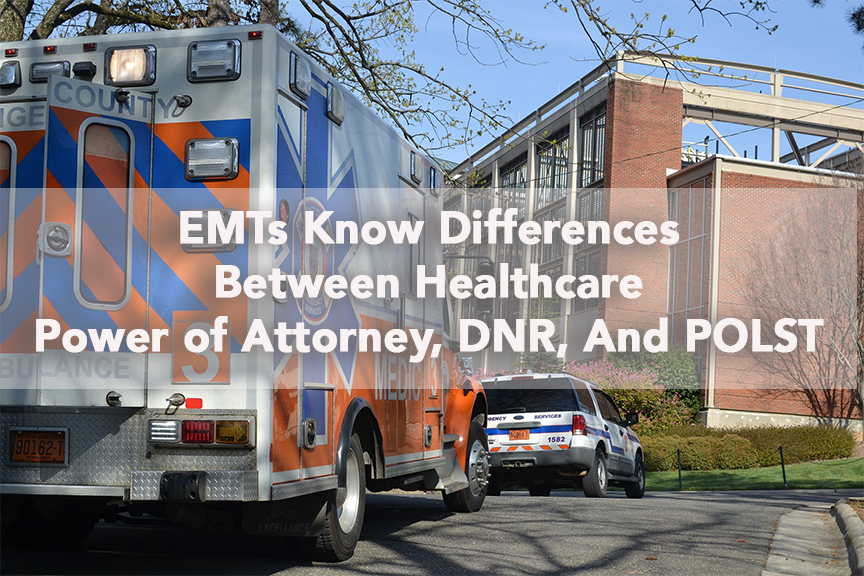Topics in Elder Law: EMTs Know Differences Between Healthcare Power of Attorney, DNR, And POLST

Topics in Elder Law – The Healthcare POA
Ensuring your DNR wishes are followed and trusting those in elder care are two important topics in elder law.
When it comes to topics in elder law… you’ve done all the right things at the right times. You created an estate plan and have an advanced directive which names a Healthcare Power of Attorney.
Due to a diagnosis of a critical illness, you decided to sign a Do Not Resuscitate (DNR) order. Then, you had your doctor sign off on an out of hospital DNR. This is also known as a Physician Orders for Life Sustaining Treatment (POLST).
But now you may be wondering what would happen in an emergency? What if you lost consciousness or the ability to speak and you were alone at home. Would an emergency medical technician (EMT) know how to proceed to ensure your wishes are followed? The basic answer is yes. That is… if you have your out of hospital DNR in a visible place where EMTs can see it.
In an emergency, if 911 is called to attend to a person who has collapsed, emergency medical services (EMS) will check for an out-of-hospital DNR order with original signatures. They will also check to see if the person is wearing an out-of-hospital DNR bracelet or necklace. This gives the EMS providers permission not to perform cardiopulmonary resuscitation (CPR). Without an out-of-hospital DNR order or POLST, emergency crews must perform CPR. This is the law in all communities.
EMS providers are not authorized to comply with a bracelet or necklace that has not been ordered by a physician.
This is one of the most important topics in elder law. An EMS provider will also perform CPR on an individual who has tattooed DNR on their body unless they also have a signed out-of-hospital DNR order. Regulations vary by state, so check with your doctor about availability of a DNR bracelet.
In the event you regain consciousness without the EMTs performing CPR or other procedures, it’s important to know that the POLST complements the advance directive but does not replace it. The Advance Directive is a set of two documents: a living will and the naming of a Healthcare Power of Attorney. An advance directive is needed to appoint a health care representative and provide guidance for future life-sustaining treatments. The DNR guides EMS providers and can give EMS permission not to perform CPR, whereas a POLST might include a DNR instruction regarding CPR but provides more instructions regarding additional medical interventions. The POLST also directs other treatment choices and interventions, such as hospitalizations or artificial nutrition and hydration.
As a reminder, it’s important to know that an advance directive is recommended for all adults, regardless of health status.
If you are ready to create an estate plan, name healthcare and financial powers of attorney for yourself and/or a loved one who may need to consider whether they want both an in hospital and out of hospital DNR, give my office a call at (470) 235-7868 and let’s make sure you are prepared to ensure that your end-of-life wishes are followed.
Looking to find an experienced estate lawyer in the Georgia area who is skilled in asset protection and estate plan preparation? Shannon Pawley is an attorney in Georgia with expertise in estate planning and asset protection. Shannon can provide assistance with creating an estate plan to include making a will and how to establish a trust properly. If you have questions about asset protection or questions about making an estate plan, reach out to Shannon and she will be glad to help answer all the estate planning questions you might have!










